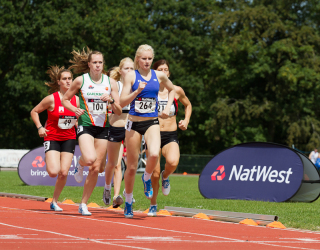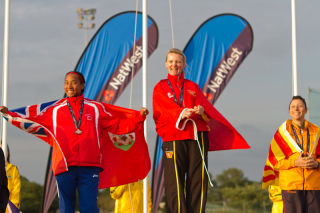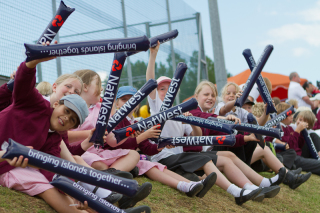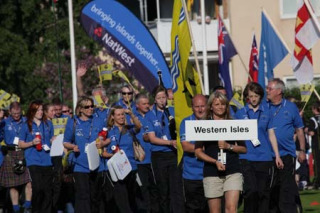About the Games
Once every two years, thousands of athletes from across the globe — from Scandinavia to the Mediterranean, the North Atlantic to the Caribbean — come together to compete in the International Island Games.

COMPETITION
Months of rigorous training are put to the test over a week of events as competitors swim, shoot, sprint and swing their way to victory. From target and endurance events to team sports such as football, basketball and volleyball, the Games holds competitions in a diverse range of sports and is open to competitors as young as 13.
The Games welcomes spectators at all events, giving host islanders an exciting—and all too rare—opportunity to watch live international sport on their home turf.
And it’s truly worth watching. Games athletes perform to an exceptional standard—each one of them living proof that small communities can achieve great things.
PRIDE
 Because there’s just something about islanders.
Because there’s just something about islanders.
Growing up in small communities surrounded and shaped by the sea instills in us an independent spirit, a fierce pride in our culture and heritage — perhaps even a touch of stubbornness. It’s what gives Games competitors the will and determination to train hard, defy the odds and reach for gold.
Thanks to the NatWest International Island Games, athletes no longer have to look to the mainland to compete at international level—they have the chance to represent their own community and raise the profile of even the smallest island.
Success at the Games is a victory not just for a single competitor or team, but for a whole nation.
INSPIRATION
We’re proud to say some of the world’s finest sportsmen and women began their careers as Games competitors:
- Mark Cavendish MBE (Isle of Man) — cycling
- Kelly Sotherton (Isle of Wight) — heptathlon and 400m
- Mattias Sunneborn (Gotland) — long jump and 200m
- Cydonie Mothersille (Cayman Islands) — 200m
- Pál Joensen (Faroe Islands) — swimming
All gold medal winners at the International Island Games, they went on to become elite international champions and competitors in the Olympics.
You can see many former members of the Games Family in top-level sporting events across the world today, and their achievements are already inspiring the next generation of athletes.
Every Games is a chance for talented young islanders to follow in their footsteps and begin the tough and thrilling journey towards sporting greatness.
FRIENDSHIP
 But the International Island Games isn’t all about scoreboards and medals. It’s a chance for thousands of young people from islands across the world to explore new places and cultures, share unforgettable experiences and form lasting friendships.
But the International Island Games isn’t all about scoreboards and medals. It’s a chance for thousands of young people from islands across the world to explore new places and cultures, share unforgettable experiences and form lasting friendships.
In striving to achieve sporting excellence, all Games competitors—as well as their coaches, managers and supporters—help us foster and strengthen our core values of sportsmanship and fair play.
It’s what we call the Spirit of the Games, and it comes alive wherever this unique event take place.
The ‘Mini Olympics’
In 1985, as part of their Year of Sport, the Isle of Man set in motion an exciting and ambitious plan to bring together athletes from small islands across the world to take part in a new sporting festival — the ‘Inter-Island Games’.
700 sportsmen and -women from 15 islands landed on Manx soil for what the UK national press dubbed the ‘Small Islands Mini Olympics’. Competitors hailed from the Faroe Islands and Scandinavia in the northern hemisphere, the British Isles, the Mediterranean and as far afield as St Helena in the South Atlantic—a 5,000-mile trip.
After a week of events in eight different sports the festival was deemed such a success it was agreed to continue it every other year, with the second Games to be held in Guernsey in 1987.
Growth of the Games
 Over the next 12 years the Games travelled to the Faroe Islands, Áland, the Isle of Wight, Gibraltar and Jersey, where the number of competitors reached 2,000.
Over the next 12 years the Games travelled to the Faroe Islands, Áland, the Isle of Wight, Gibraltar and Jersey, where the number of competitors reached 2,000.
Many more islands expressed a desire to join the Games Family, and representatives of a wide variety of sports lobbied for inclusion.
As enthusiasm for the Games grew, the event became hugely important to the islands’ sporting communities. The possibility of being chosen to represent their home island in the Games became a strong motivator for young athletes to train hard and fulfil their potential.
The islands’ goverments also began to realise what a positive impact sport could have on a small community; promoting a healthy lifestyle, providing a focus for young people and strengthening a nation’s cultural identity.
Going the distance
In 1998 the Games secured sponsorship with NatWest International, which provided financial assistance to host islands to ease the significant cost of hosting such a large-scale event.
The International Island Games – bringing islands together.
Be a part of the Games Family
Follow us on Facebook and Twitter to keep up with the latest Games news
and discover how to get involved with sport on your island.



